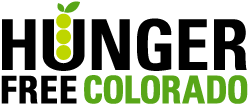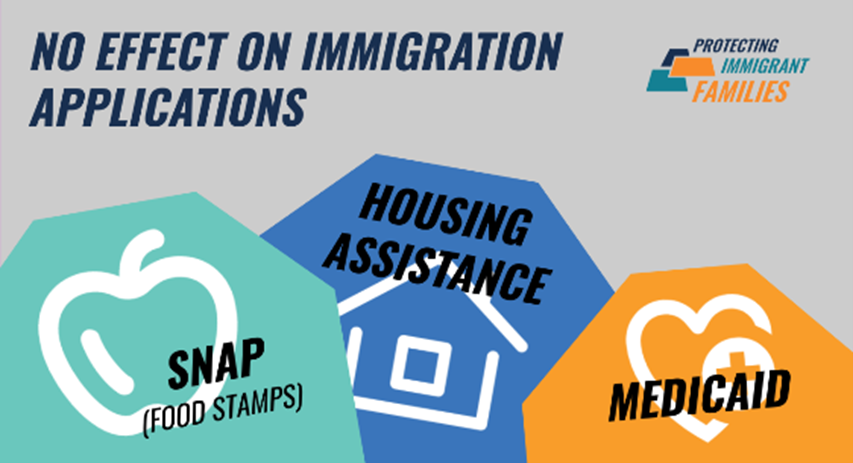Some persons applying for a green card or visa to enter the US are required to pass a “public charge test.” The public charge test looks at whether a person is likely to primarily depend on the government for support. The Biden Administration finalized a new public charge rule that goes into effect on December 23, 2022. The new public charge rule codifies longstanding guidance, and states that the public charge test does NOT apply to all immigrants, and that most public benefits are NOT considered in the public charge test. Immigrants and their families can safely access all health, nutrition, and housing programs if they qualify. This page explains the public charge rule and food resources that are available to immigrants in Colorado.
What is public charge?
Some people who apply for a green card (lawful permanent resident status) or a visa to enter the U.S. must pass a “public charge” test. This test looks at whether the person is likely to depend primarily on government services in the future.
Immigration officials look at all of a person’s circumstances, including their:
- Age
- Income
- Health
- Education or skills
- Family situation
- Previous or current use of only two specific types of public benefits: Cash assistance programs that provide on-going payments and long-term institutional care
Who does public charge apply to?
Public charge does not apply to everyone.
The following “Humanitarian” immigrants are not affected by public charge:
- Refugees
- Asylees
- Many survivors of trafficking, domestic violence and other serious crimes
- Special immigrant juveniles
- Certain individuals paroled in the US
Lawful permanent residents (or people with “green cards”) do not face a public charge test unless they leave the U.S. for over 180 days and seek to reenter. There is also no public charge test when an immigrant applies for U.S. citizenship, green card renewal, asylum, DACA, TPS, or DED (Deferred Enforced Departure).
What benefits are considered in the public charge test?
Immigration officials can only look at two types of public benefits during a public charge test.
The only public benefits considered in a public charge test are:
- Cash assistance programs that provide income maintenance through ongoing payments (SSI, TANF (Colorado Works), or General Assistance)
- Long-term institutional care at government expense (such as a nursing home paid for by the government)
If you have used these specific programs in the past, you still have a chance to show that you are not likely to become a public charge. Immigration officials must look at the “totality of circumstances” when they review your green card or visa application. This includes your age, health, income, assets, resources, education/skills, family you must support, and family who will support you.
If a family member has used these benefits, it will not affect you in a public charge test unless you relied on your family member’s benefits as your primary source of support.
Most public benefits do not affect a person’s immigration status.
While it is understandable that many immigrants are fearful that accessing any public benefit will make them a public charge, this is fortunately not the case. The public benefits described in the previous section are the only benefits that are considered in a public charge test. Immigration officials cannot look at a person’s use of other government programs.
President Biden codified longstanding guidance into rule, and explicitly clarified that the following public benefits are NOT considered in the public charge test. Immigrants who qualify can safely participate in the following public programs, without fearing that their participation in these programs will affect their immigration status in any way.
- All Food and Nutrition Programs, such as the Supplemental Nutrition Assistance Program (SNAP – formerly Food Stamps), the Special Supplemental Nutritional Program for Women, Infants, and Children (WIC), school meal programs, and food banks and pantries.
The US government has made clear that nutrition benefits will NOT be considered in a public charge test. The US Department of Agriculture (USDA) and U.S. Citizenship and Immigration Services (USCIS) recently issued a letter to SNAP Community partners, acknowledging the fear around public charge in immigrant communities, and providing reassurance that food programs like the Supplemental Nutritional Assistance Program (SNAP) do not affect an individual’s immigration status. Eligible persons are encouraged to apply.
- Health coverage, such as Medicaid, Emergency Medicaid, Children’s Health Insurance Program (CHIP), and insurance through Connect for Health Colorado. The only exception to this is long-term institutional care.
- Housing programs, such as Section 8, public housing, and other housing benefits.
- Earnings-based benefits, such as Social Security, retirement, pensions, and veteran benefits.
- Pandemic relief, such as Pandemic Electronic Benefits Transfer (P-EBT), stimulus payments, child tax credits, emergency rental assistance, as well as tests and vaccines.
There are many food resources available to Colorado immigrants.
Access to nutritious food is linked to good health. If you can’t afford the food you need, the following resources can help. Using these programs will NOT hurt your immigration status now or in the future.
For Immigrants of All Statuses (Including Undocumented):
Community Food Sites
- Food pantries, food boxes and meal sites offer free food/meals to families or individuals.
Visit COFoodFinder.org to find sites near you. - School meals are available for free to eligible students in most schools. Contact your school district to apply for free or reduced-price school meals.
- Summer meals are available during summer months to all youth (18 and under). Visit KidsFoodFinder.org to find summer meals sites near you.
Nutrition Programs
- The Special Supplemental Nutrition Program for Women, Infants, and Children (WIC) provides healthy food (such as fruits, vegetables, and baby food), nutrition education, breastfeeding support, and other free services for pregnant women, postpartum women, and children under the age of five. Request an appointment at ColoradoWICSignUp.com.
- Pandemic EBT (P-EBT) provides grocery money to families with children that are eligible for free or reduced-price lunch and missed school meals due to the pandemic. Learn more at CDHS.Colorado.gov/P-EBT.
Many immigrant families can also use SNAP to buy the food they need:
- Supplemental Nutrition Assistance Program (SNAP): Some immigrants that meet income requirements can also receive SNAP. SNAP gives you funds on an EBT card each month to buy the food you choose. Applying for or receiving SNAP benefits will NOT hurt your current or future immigration status. SNAP is NOT considered in a public charge test.
You may qualify if you or a family member are a:
- “Humanitarian” immigrant (this includes refugees; asylees; and survivors of trafficking, domestic violence, and other serious crimes)
- Lawful permanent resident (with residency for 5+ years, a military connection, 40 qualifying work quarters, a disability, or under age 18)
- U.S. citizen
Also:
- Parents of U.S citizen children may also apply for their children
- University students that meet income and enrollment criteria can also receive food help from SNAP! Learn more about student eligibility
Learn more and apply for SNAP at Colorado.gov/PEAK.

